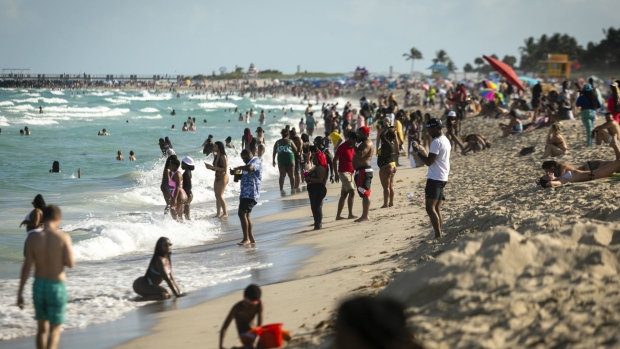Mar 24, 2023
Miami Beach Mayor Wants to End One of the US’s Wildest Parties
, Bloomberg News

(Bloomberg) -- Miami Beach Mayor Dan Gelber wants to crush one of the US’s biggest parties.
Gelber is looking to make the Florida city as unappealing as possible for the spring break crowd, restricting alcohol sales and shutting down local businesses earlier, after declaring a state of emergency to halt violence for the second straight year. His proposals face stiff opposition from city officials and bar owners.
“It’s time Miami Beach gets rid of spring break,” Gelber said in an interview. “Spring break is not a driver for the kind of economy we want.”
Gelber’s desire to shoo away spring breakers underscores a larger shift taking place in Miami Beach. The city has long been known for being both a party destination and haven for the wealthy, with its waterfront mansions and posh islands.
But the pandemic accelerated the arrival of the ultra rich looking for a better work-life balance and lower taxes, leading to a surge in real estate prices, as well as a growing number of conferences and fairs. New businesses have opened catering to the well-off, like an outpost of Major Food Group restaurant, Carbone.
For Gelber, it means Miami Beach can now do just fine with revenue from events like its yearly Art Basel, one of the world’s most important contemporary art fairs, without depending on the rowdy and drunken revelers.
Read More: NYC Falls, Florida Gains in Shift of Most-Expensive Areas in US
There’s no official figure of how many people actually visit Miami Beach during spring break. But Gelber estimates the destination can draw as many as 40,000 people, mostly young adults, on the busiest days, in a city of about 90,000 residents.
When the sun’s out, the raucous crowd occupies almost every inch of sand in South Beach. At night, party-goers move on to the Ocean Drive entertainment district, where they jumped atop of cars last weekend. Two fatal shootings led the city to declare a state of emergency and impose a curfew Sunday night.
Gelber had pushed for extending the curfew into next weekend, but city officials voted against it on Monday, which the mayor said was a mistake. They instead approved restrictions on alcohol sales.
Laura Dominguez, a city commissioner who opposed the curfew, said adding curbs would have economic impact on bars and local jobs. Another solution would be discouraging guns by installing multiple metal detectors, vice-mayor Steven Meiner said in an interview, though there’s no consensus, as the detectors would need to cover a wide area that couldn’t all be fenced in.
For next year, Gelber is looking to roll back alcohol sales restrictions and order early closures of bars for at least two weeks in March. But there’s a more immediate test: This weekend, spring break will coincide with the Ultra Music Festival, a top electronic music event, which draws thousands of people to Miami.
“Every year we keep saying we want to get rid of spring break,” Meiner said. “Our intentions are great, but it’s not working; crowds keep increasing and the violence keeps coming.”
©2023 Bloomberg L.P.


